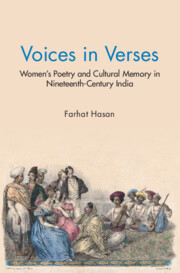Book contents
- Frontmatter
- Dedication
- Contents
- Acknowledgements
- A Note on Transliteration
- List of Abbreviations
- 1 Introduction
- 2 Unravelling the Texts: Memory, Reforms, and Literary Sulh-i-Kul
- 3 Representing an Inclusive Literary Culture: Women Poets in the Bazaars and Kothas
- 4 Representing the Kothas: The Two Sisters in the Literary Sphere
- 5 Commemorating Women Poets: Memory, Gender, and the Literary Culture in the Persianate World
- 6 Secluded Poets in Literary Spaces: Memorializing Female Rulers, Consorts, and Memsahibs
- 7 Conclusion
- Glossary
- Bibliography
- Index
7 - Conclusion
Published online by Cambridge University Press: 06 March 2024
- Frontmatter
- Dedication
- Contents
- Acknowledgements
- A Note on Transliteration
- List of Abbreviations
- 1 Introduction
- 2 Unravelling the Texts: Memory, Reforms, and Literary Sulh-i-Kul
- 3 Representing an Inclusive Literary Culture: Women Poets in the Bazaars and Kothas
- 4 Representing the Kothas: The Two Sisters in the Literary Sphere
- 5 Commemorating Women Poets: Memory, Gender, and the Literary Culture in the Persianate World
- 6 Secluded Poets in Literary Spaces: Memorializing Female Rulers, Consorts, and Memsahibs
- 7 Conclusion
- Glossary
- Bibliography
- Index
Summary
Reading the biographical compendia of women poets written in the nineteenth century, we cannot but appreciate the impressive presence of women in the literary field. However, this impression fades away when we look at the more popular literary biographies, anthologies, critical literature, and instruction manuals; in the dominant literary strands, indeed women poets are scarce, if not totally absent. The nineteenth century was the period in which the figure of a woman poet evoked moral anxieties, resulting from the reformist zeal to keep women away from eros and love, and other emotions associated with Persianate poetry. Elite women should, for sure, be educated but only in the subjects that helped them efficiently manage their domestic spaces; there were, as we see in several reformist texts, detailed discussions on what women should and should not read, and among the books that they were instructed to shun were romantic tales and works of poetry. Commendably, the women's tazkiras contest these assumptions, and make available to the interested readers an archive of women's voices, and draw our attention to the ever-present but barely recognized contribution of women poets to the shaping of the literary culture in early modern Hindustan.
It is not without basis to argue that women's lyrical compositions represented a marginalized and incongruent literary culture, but doing so would be banal and simplistic and, above all, quite ahistorical. Women poets were present in poetic assemblies (mushā‘ira) organized by aristocrats and rich patrons; and in the salons of the courtesans, young men learnt the niceties of language, and men of letters experimented with new forms of thought and expression. In our study of women littérateurs here, we have seen that their lyrics, despite their creative depths and fresh signifying practices, were firmly obedient to the literary adāb, or the norms of aesthetics and expression. Their interventions in the literary field served to enrich and deepen the field, even as they continually challenged and contested its dominant assumptions. It is for this reason that I described their compositions, in one of the earlier chapters, as situated within the realm of what Foucault terms as ‘subjugated knowledges’, reflecting a cultural practice that was ‘masked’ by the power-language ensemble of relations but still conversed with the dominant literary and aesthetic norms and values in an aporetic relationship where women's speech both reinforced and challenged them.
- Type
- Chapter
- Information
- Voices in VersesWomen's Poetry and Cultural Memory in Nineteenth-Century India, pp. 168 - 174Publisher: Cambridge University PressPrint publication year: 2024



